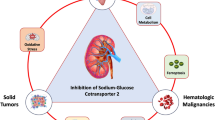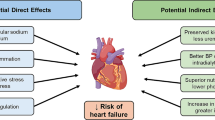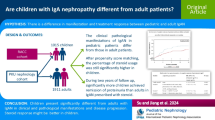Abstract
The intrarenal renin–angiotensin system (RAS) has many well-documented pathophysiologic functions in both blood pressure regulation and renal disease development. Angiotensin II (Ang II) is the major bioactive product of the RAS. It induces inflammation, renal cell growth, mitogenesis, apoptosis, migration, and differentiation. In addition, Ang II regulates the gene expression of bioactive substances and activates multiple intracellular signaling pathways that are involved in renal damage. Activation of the Ang II type 1 (AT1) receptor pathway results in the production of proinflammatory mediators, intracellular formation of reactive oxygen species, cell proliferation, and extracellular matrix synthesis, which in turn facilities renal injury. Involvement of angiotensinogen (AGT) in intrarenal RAS activation and development of renal disease has previously been reported. Moreover, studies have demonstrated that the urinary excretion rates of AGT provide a specific index of the intrarenal RAS status. Enhanced intrarenal AGT levels have been observed in experimental models of renal disease, supporting the concept that AGT plays an important role in the development and progression of renal disease. In this review, we focus on the role of intrarenal RAS activation in the pathophysiology of renal disease. Additionally, we explored the potential of urinary AGT as a novel biomarker of intrarenal RAS status in renal disease.

Similar content being viewed by others
References
Navar LG (2014) Intrarenal renin–angiotensin system in regulation of glomerular function. Curr Opin Nephrol Hypertens 23:38–45
Kobori H, Nangaku M, Navar LG, Nishiyama A (2007) The intrarenal renin–angiotensin system: from physiology to the pathobiology of hypertension and kidney disease. Pharmacol Rev 59:251–287
Carey RM, Siragy HM (2003) The intrarenal renin–angiotensin system and diabetic nephropathy. Trends Endocrinol Metab 14:274–281
Santos RA, Simoes e Silva AC, Maric C, Silva DM, Machado RP, de Buhr I, Heringer-Walther S, Pinheiro SV, Lopes MT, Bader M, Mendes EP, Lemos VS, Campagnole-Santos MJ, Schultheiss HP, Speth R, Walther T (2003) Angiotensin-(1–7) is an endogenous ligand for the G protein-coupled receptor Mas. Proc Natl Acad Sci USA 100:8258–8263
Carey RM, Wang ZQ, Siragy HM (2000) Role of the angiotensin type 2 receptor in the regulation of blood pressure and renal function. Hypertension 35:155–163
Navar LG, Prieto-Carrasquero MC, Kobori H (2006) Chapter 1: Molecular aspects of the renal renin–angiotensin system. In: Re RN, DiPette DJ, Schiffrin EL, Sowers JR (eds) Molecular mechanisms in hypertension, 1st edn. Taylor & Francis Medical, Milton Park, Oxfordshire, pp 3–14
Kobori H, Urushihara M (2013) Augmented intrarenal and urinary angiotensinogen in hypertension and chronic kidney disease. Pflugers Arch 465:3–12
Henrich WL, McAllister EA, Eskue A, Miller T, Moe OW (1996) Renin regulation in cultured proximal tubular cells. Hypertension 27:1337–1340
Sibony M, Gasc JM, Soubrier F, Alhenc-Gelas F, Corvol P (1993) Gene expression and tissue localization of the two isoforms of angiotensin I converting enzyme. Hypertension 21:827–835
Vio CP, Jeanneret VA (2003) Local induction of angiotensin-converting enzyme in the kidney as a mechanism of progressive renal diseases. Kidney Int Suppl 2003(86):S57–63
Casarini DE, Boim MA, Stella RC, Krieger-Azzolini MH, Krieger JE, Schor N (1997) Angiotensin I-converting enzyme activity in tubular fluid along the rat nephron. Am J Physiol 272:F405–F409
Shao W, Seth DM, Prieto MC, Kobori H, Navar LG (2013) Activation of the renin–angiotensin system by a low-salt diet does not augment intratubular angiotensinogen and angiotensin II in rats. Am J Physiol Renal Physiol 304:F505–F514
Ingert C, Grima M, Coquard C, Barthelmebs M, Imbs JL (2002) Effects of dietary salt changes on renal renin–angiotensin system in rats. Am J Physiol Renal Physiol 283:F995–F1002
Ingert C, Grima M, Coquard C, Barthelmebs M, Imbs JL (2002) Contribution of angiotensin II internalization to intrarenal angiotensin II levels in rats. Am J Physiol Renal Physiol 283:F1003–F1010
Navar LG, Kobori H, Prieto MC, Gonzalez-Villalobos RA (2011) Intratubular renin–angiotensin system in hypertension. Hypertension 57:355–362
Navar LG (1997) The kidney in blood pressure regulation and development of hypertension. Med Clin North Am 81:1165–1198
Siragy HM, Inagami T, Ichiki T, Carey RM (1999) Sustained hypersensitivity to angiotensin II and its mechanism in mice lacking the subtype-2 (AT2) angiotensin receptor. Proc Natl Acad Sci USA 96:6506–6510
Nishiyama A, Seth DM, Navar LG (2003) Angiotensin II type 1 receptor-mediated augmentation of renal interstitial fluid angiotensin II in angiotensin II-induced hypertension. J Hypertens 21:1897–1903
Komlosi P, Fuson AL, Fintha A, Peti-Peterdi J, Rosivall L, Warnock DG, Bell PD (2003) Angiotensin I conversion to angiotensin II stimulates cortical collecting duct sodium transport. Hypertension 42:195–199
Kobori H, Nishiyama A, Harrison-Bernard LM, Navar LG (2003) Urinary angiotensinogen as an indicator of intrarenal Angiotensin status in hypertension. Hypertension 41:42–49
Meng S, Cason GW, Gannon AW, Racusen LC, Manning RD Jr (2003) Oxidative stress in Dahl salt-sensitive hypertension. Hypertension 41:1346–1352
Tojo A, Onozato ML, Kobayashi N, Goto A, Matsuoka H, Fujita T (2002) Angiotensin II and oxidative stress in Dahl Salt-sensitive rat with heart failure. Hypertension 40:834–839
Wilcox CS (2010) Effects of tempol and redox-cycling nitroxides in models of oxidative stress. Pharmacol Ther 126:119–145
Sechi LA, Griffin CA, Giacchetti G, Valentin JP, Llorens-Cortes C, Corvol P, Schambelan M (1996) Tissue-specific regulation of type 1 angiotensin II receptor mRNA levels in the rat. Hypertension 28:403–408
Ingelfinger JR, Pratt RE, Ellison K, Dzau VJ (1986) Sodium regulation of angiotensinogen mRNA expression in rat kidney cortex and medulla. J Clin Invest 78:1311–1315
Kobori H, Nishiyama A, Abe Y, Navar LG (2003) Enhancement of intrarenal angiotensinogen in Dahl salt-sensitive rats on high salt diet. Hypertension 41:592–597
Velez JC, Ierardi JL, Bland AM, Morinelli TA, Arthur JM, Raymond JR, Janech MG (2012) Enzymatic processing of angiotensin peptides by human glomerular endothelial cells. Am J Physiol Renal Physiol 302:F1583–F1594
Urushihara M, Seki Y, Tayama T, Nagai T, Kinoshita Y, Jamba A, Kondo S, Kagami S (2013) Glomerular angiotensin-converting enzyme 2 in pediatric IgA nephropathy. Am J Nephrol 38:355–367
Schwacke JH, Spainhour JC, Ierardi JL, Chaves JM, Arthur JM, Janech MG, Velez JC (2013) Network modeling reveals steps in angiotensin peptide processing. Hypertension 61:690–700
Doblinger E, Hocherl K, Mederle K, Kattler V, Walter S, Hansen PB, Jensen B, Castrop H (2012) Angiotensin AT1 receptor-associated protein Arap1 in the kidney vasculature is suppressed by angiotensin II. Am J Physiol Renal Physiol 302:F1313–F1324
Urushihara M, Kinoshita Y, Kondo S, Kagami S (2012) Involvement of the intrarenal renin–angiotensin system in experimental models of glomerulonephritis. J Biomed Biotechnol 2012:601786
Kagami S, Border WA, Miller DE, Noble NA (1994) Angiotensin II stimulates extracellular matrix protein synthesis through induction of transforming growth factor-beta expression in rat glomerular mesangial cells. J Clin Invest 93:2431–2437
Kondo S, Shimizu M, Urushihara M, Tsuchiya K, Yoshizumi M, Tamaki T, Nishiyama A, Kawachi H, Shimizu F, Quinn MT, Lambeth DJ, Kagami S (2006) Addition of the antioxidant probucol to angiotensin II type I receptor antagonist arrests progressive mesangioproliferative glomerulonephritis in the rat. J Am Soc Nephrol 17:783–794
Nishimoto S, Nishida E (2006) MAPK signalling: ERK5 versus ERK1/2. EMBO Rep 7:782–786
Bokemeyer D, Panek D, Kramer HJ, Lindemann M, Kitahara M, Boor P, Kerjaschki D, Trzaskos JM, Floege J, Ostendorf T (2002) In vivo identification of the mitogen-activated protein kinase cascade as a central pathogenic pathway in experimental mesangioproliferative glomerulonephritis. J Am Soc Nephrol 13:1473–1480
Urushihara M, Takamatsu M, Shimizu M, Kondo S, Kinoshita Y, Suga K, Kitamura A, Matsuura S, Yoshizumi M, Tamaki T, Kawachi H, Kagami S (2010) ERK5 activation enhances mesangial cell viability and collagen matrix accumulation in rat progressive glomerulonephritis. Am J Physiol Renal Physiol 298:F167–F176
Wada T, Yokoyama H, Furuichi K, Kobayashi KI, Harada K, Naruto M, Su SB, Akiyama M, Mukaida N, Matsushima K (1996) Intervention of crescentic glomerulonephritis by antibodies to monocyte chemotactic and activating factor (MCAF/MCP-1). FASEB J 10:1418–1425
Kinoshita Y, Kondo S, Urushihara M, Suga K, Matsuura S, Takamatsu M, Shimizu M, Nishiyama A, Kawachi H, Kagami S (2011) Angiotensin II type I receptor blockade suppresses glomerular renin–angiotensin system activation, oxidative stress, and progressive glomerular injury in rat anti-glomerular basement membrane glomerulonephritis. Transl Res 158:235–248
Ozawa Y, Kobori H, Suzaki Y, Navar LG (2007) Sustained renal interstitial macrophage infiltration following chronic angiotensin II infusions. Am J Physiol Renal Physiol 292:F330–F339
Urushihara M, Ohashi N, Miyata K, Satou R, Acres OW, Kobori H (2011) Addition of angiotensin II type 1 receptor blocker to CCR2 antagonist markedly attenuates crescentic glomerulonephritis. Hypertension 57:586–593
Nagai T, Urushihara M, Kinoshita Y, Jamba A, Kondo S, Kagami S (2015) Differential regulation of angiotensin II-induced extracellular signal regulated kinase-1/2 and −5 in progressive glomerulonephritis. Nephrology. doi:10.1111/nep.12685
Mitani S, Yabuki A, Taniguchi K, Yamato O (2013) Association between the intrarenal renin–angiotensin system and renal injury in chronic kidney disease of dogs and cats. J Vet Med Sci 75:127–133
Ingelfinger JR, Zuo WM, Fon EA, Ellison KE, Dzau VJ (1990) In situ hybridization evidence for angiotensinogen messenger RNA in the rat proximal tubule. An hypothesis for the intrarenal renin angiotensin system. J Clin Invest 85:417–423
Lantelme P, Rohrwasser A, Gociman B, Hillas E, Cheng T, Petty G, Thomas J, **ao S, Ishigami T, Herrmann T, Terreros DA, Ward K, Lalouel JM (2002) Effects of dietary sodium and genetic background on angiotensinogen and renin in mouse. Hypertension 39:1007–1014
Navar LG, Harrison-Bernard LM, Nishiyama A, Kobori H (2002) Regulation of intrarenal angiotensin II in hypertension. Hypertension 39:316–322
Rohrwasser A, Morgan T, Dillon HF, Zhao L, Callaway CW, Hillas E, Zhang S, Cheng T, Inagami T, Ward K, Terreros DA, Lalouel JM (1999) Elements of a paracrine tubular renin–angiotensin system along the entire nephron. Hypertension 34:1265–1274
Nakano D, Kobori H, Burford JL, Gevorgyan H, Seidel S, Hitomi H, Nishiyama A, Peti-Peterdi J (2012) Multiphoton imaging of the glomerular permeability of angiotensinogen. J Am Soc Nephrol 23:1847–1856
Takamatsu M, Urushihara M, Kondo S, Shimizu M, Morioka T, Oite T, Kobori H, Kagami S (2008) Glomerular angiotensinogen protein is enhanced in pediatric IgA nephropathy. Pediatr Nephrol 23:1257–1267
Ohashi N, Urushihara M, Satou R, Kobori H (2010) Glomerular angiotensinogen is induced in mesangial cells in diabetic rats via reactive oxygen species—ERK/JNK pathways. Hypertens Res 33:1174–1181
Matsusaka T, Niimura F, Pastan I, Shintani A, Nishiyama A, Ichikawa I (2014) Podocyte injury enhances filtration of liver-derived angiotensinogen and renal angiotensin II generation. Kidney Int 85:1068–1077
Kobori H, Harrison-Bernard LM, Navar LG (2001) Expression of angiotensinogen mRNA and protein in angiotensin II-dependent hypertension. J Am Soc Nephrol 12:431–439
Yamamoto T, Nakagawa T, Suzuki H, Ohashi N, Fukasawa H, Fujigaki Y, Kato A, Nakamura Y, Suzuki F, Hishida A (2007) Urinary angiotensinogen as a marker of intrarenal angiotensin II activity associated with deterioration of renal function in patients with chronic kidney disease. J Am Soc Nephrol 18:1558–1565
Katsurada A, Hagiwara Y, Miyashita K, Satou R, Miyata K, Ohashi N, Navar LG, Kobori H (2007) Novel sandwich ELISA for human angiotensinogen. Am J Physiol Renal Physiol 293:F956–F960
Kobori H, Alper AB Jr, Shenava R, Katsurada A, Saito T, Ohashi N, Urushihara M, Miyata K, Satou R, Hamm LL, Navar LG (2009) Urinary angiotensinogen as a novel biomarker of the intrarenal renin–angiotensin system status in hypertensive patients. Hypertension 53:344–350
Saito T, Urushihara M, Kotani Y, Kagami S, Kobori H (2009) Increased urinary angiotensinogen is precedent to increased urinary albumin in patients with type 1 diabetes. Am J Med Sci 338:478–480
Kobori H, Urushihara M, Xu JH, Berenson GS, Navar LG (2010) Urinary angiotensinogen is correlated with blood pressure in men (Bogalusa Heart Study). J Hypertens 28:1422–1428
Urushihara M, Kondo S, Kagami S, Kobori H (2010) Urinary angiotensinogen accurately reflects intrarenal renin–angiotensin system activity. Am J Nephrol 31:318–325
Nishiyama A, Konishi Y, Ohashi N, Morikawa T, Urushihara M, Maeda I, Hamada M, Kishida M, Hitomi H, Shirahashi N, Kobori H, Imanishi M (2011) Urinary angiotensinogen reflects the activity of intrarenal renin–angiotensin system in patients with IgA nephropathy. Nephrol Dial Transplant 26:170–177
Kim SS, Song SH, Kim IJ, Yang JY, Lee JG, Kwak IS, Kim YK (2012) Clinical implication of urinary tubular markers in the early stage of nephropathy with type 2 diabetic patients. Diabetes Res Clin Pract 97:251–257
Sawaguchi M, Araki SI, Kobori H, Urushihara M, Haneda M, Koya D, Kashiwagi A, Uzu T, Maegawa H (2012) Association between urinary angiotensinogen levels and renal and cardiovascular prognoses in patients with type 2 diabetes mellitus. J Diabetes Investig 3:318–324
Alge JL, Karakala N, Neely BA, Janech MG, Tumlin JA, Chawla LS, Shaw AD, Arthur JM, Investigators SA (2013) Urinary angiotensinogen and risk of severe AKI. Clin J Am Soc Nephrol 8:184–193
Alge JL, Karakala N, Neely BA, Janech MG, Velez JC, Arthur JM, Investigators SA (2013) Urinary angiotensinogen predicts adverse outcomes among acute kidney injury patients in the intensive care unit. Crit Care 17:R69
Alge JL, Karakala N, Neely BA, Janech MG, Tumlin JA, Chawla LS, Shaw AD, Arthur JM, Investigators SA (2013) Association of elevated urinary concentration of renin–angiotensin system components and severe AKI. Clin J Am Soc Nephrol 8:2043–2052
Soltysiak J, Skowronska B, Fichna P, Ostalska-Nowicka D, Stankiewicz W, Lewandowska-Stachowiak M, Lipkowska K, Zachwieja J (2014) Urinary angiotensinogen and urinary sodium are associated with blood pressure in normoalbuminuric children with diabetes. Pediatr Nephrol 29:2373–2378
Nishizaki N, Hirano D, Nishizaki Y, Fu**aga S, Nagata S, Ohtomo Y, Kaneko K, Shimizu T (2014) Increased urinary angiotensinogen is an effective marker of chronic renal impairment in very low birth weight children. Clin Exp Nephrol 18:642–648
Urushihara M, Nagai T, Kinoshita Y, Nishiyama S, Suga K, Ozaki N, Jamba A, Kondo S, Kobori H, Kagami S (2015) Changes in urinary angiotensinogen posttreatment in pediatric IgA nephropathy patients. Pediatr Nephrol 30:975–982
Suzue M, Urushihara M, Nakagawa R, Saijo T, Kagami S (2015) Urinary angiotensinogen level is increased in preterm neonates. Clin Exp Nephrol 19:293–297
Isobe S, Ohashi N, Fujikura T, Tsuji T, Sakao Y, Yasuda H, Kato A, Miyajima H, Fujigaki Y (2015) Disturbed circadian rhythm of the intrarenal renin–angiotensin system: relevant to nocturnal hypertension and renal damage. Clin Exp Nephrol 19:231–239
Ishigaki S, Ohashi N, Isobe S, Tsuji N, Iwakura T, Ono M, Sakao Y, Tsuji T, Kato A, Miyajima H, Yasuda H (2016) Impaired endogenous nighttime melatonin secretion relates to intrarenal renin–angiotensin system activation and renal damage in patients with chronic kidney disease. Clin Exp Nephrol. doi:10.1007/s10157-015-1244-x
Kobori H, Harrison-Bernard LM, Navar LG (2002) Urinary excretion of angiotensinogen reflects intrarenal angiotensinogen production. Kidney Int 61:579–585
Godin N, Liu F, Lau GJ, Brezniceanu ML, Chenier I, Filep JG, Ingelfinger JR, Zhang SL, Chan JS (2010) Catalase overexpression prevents hypertension and tubular apoptosis in angiotensinogen transgenic mice. Kidney Int 77:1086–1097
Coresh J, Selvin E, Stevens LA, Manzi J, Kusek JW, Eggers P, Van Lente F, Levey AS (2007) Prevalence of chronic kidney disease in the United States. JAMA 298:2038–2047
Anonymous (1993) The effect of intensive treatment of diabetes on the development and progression of long-term complications in insulin-dependent diabetes mellitus. The Diabetes Control and Complications Trial Research Group. N Engl J Med 329:977–986
Perkins BA, Ficociello LH, Silva KH, Finkelstein DM, Warram JH, Krolewski AS (2003) Regression of microalbuminuria in type 1 diabetes. N Engl J Med 348:2285–2293
Alge JL, Arthur JM (2015) Biomarkers of AKI: a review of mechanistic relevance and potential therapeutic implications. Clin J Am Soc Nephrol 10:147–155
Fukuda M, Urushihara M, Wakamatsu T, Oikawa T, Kobori H (2012) Proximal tubular angiotensinogen in renal biopsy suggests nondipper BP rhythm accompanied by enhanced tubular sodium reabsorption. J Hypertens 30:1453–1459
Isobe S, Ohashi N, Ishigaki S, Tsuji T, Sakao Y, Kato A, Miyajima H, Fujigaki Y, Nishiyama A, Yasuda H (2016) Augmented circadian rhythm of the intrarenal renin–angiotensin systems in anti-thymocyte serum nephritis rats. Hypertens Res 39:312–320
Madsen K, Tinning AR, Marcussen N, Jensen BL (2013) Postnatal development of the renal medulla; role of the renin–angiotensin system. Acta Physiol (Oxf) 208:41–49
Acknowledgments
The authors acknowledge the critical discussion and/or excellent technical assistance from Shuji Kondo, Maki Shimizu, Masanori Takamatsu, Kenichi Suga, Sato Matsuura, Yukiko Kinoshita, Natsuko Kishi, Takashi Nagai, Naomi Okamoto, Chizuko Yamamoto (Tokushima University Graduate School), L. Gabriel Navar, and Hiroyuki Kobori (Tulane University). These studies were supported by grants-in-aid from the Ministry of Education, Culture, Sports, Science, and Technology of Japan and the National Institute of Diabetes and Digestive and Kidney Disease and the National Center for Research Resources.
Author information
Authors and Affiliations
Corresponding author
Ethics declarations
Conflict of interest
None.
Rights and permissions
About this article
Cite this article
Urushihara, M., Kagami, S. Role of the intrarenal renin–angiotensin system in the progression of renal disease. Pediatr Nephrol 32, 1471–1479 (2017). https://doi.org/10.1007/s00467-016-3449-7
Received:
Revised:
Accepted:
Published:
Issue Date:
DOI: https://doi.org/10.1007/s00467-016-3449-7




